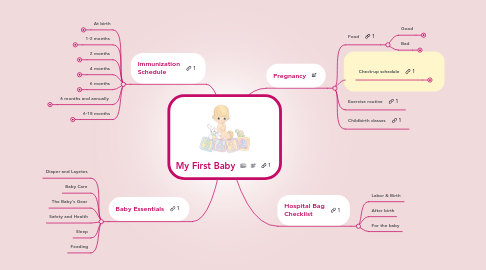
1. Baby Essentials
1.1. Diaper and Layetes
1.2. Baby Care
1.3. The Baby's Gear
1.4. Safety and Health
1.5. Sleep
1.6. Feeding
2. Immunization Schedule
2.1. At birth
2.1.1. Hepatitis B vaccine (HBV)
2.2. 1-2 months
2.2.1. Second dose HBV
2.3. 2 months
2.3.1. DTaP: Diphtheria, tetanus, and acellular pertussis vaccine
2.3.2. Hib: Haemophilus influenzae type b vaccine
2.3.3. IPV: Inactivated poliovirus vaccine
2.3.4. PCV: Pneumococcal conjugate vaccine
2.3.5. Rota: Rotavirus vaccine
2.4. 4 months
2.4.1. DTaP
2.4.2. Hib
2.4.3. IPV
2.4.4. PCV
2.4.5. Rota
2.5. 6 months
2.5.1. DTaP
2.5.2. Hib
2.5.3. PCV
2.5.4. Rota
2.6. 6 months and annually
2.6.1. Influenza
2.7. 6-18 months
2.7.1. HBV
2.7.2. IPV
3. Hospital Bag Checklist
3.1. Labor & Birth
3.2. After birth
3.3. For the baby
4. Pregnancy
4.1. Food
4.1.1. Good
4.1.1.1. Lean meat
4.1.1.2. Leafy vegetables
4.1.1.3. Whole grain bread
4.1.1.4. Unsaturated fats
4.1.1.5. (Non-fat) milk
4.1.1.6. Beans and lentils
4.1.1.7. Low mercury fish
4.1.1.8. Foods that are high in folate and Vitamin B
4.1.1.9. Drink lots of water!
4.1.2. Bad
4.1.2.1. Soft cheese
4.1.2.2. Deli meats that have not been cooked
4.1.2.3. High mercury fish
4.1.2.4. Raw eggs
4.1.2.5. Alcohol
4.2. Check-up schedule
4.2.1. 8-12 weeks: Initial prenatal visit
4.2.2. Optional genetic counseling visit
4.2.3. First two trimesters: Prenatal visits continue every 4-6 weeks
4.2.4. 15 to 20 weeks: Quad Screen test
4.2.5. 27 or 28 weeks: Glucose challenge test
4.2.6. 28 to 36 weeks: After 28 weeks, prenatal visits continue every 2-3 weeks until 36 weeks.
4.2.7. 36 weeks: Pelvic exam and Group B Strep test
4.2.8. 36 to 40 weeks
4.2.9. 40+ weeks
